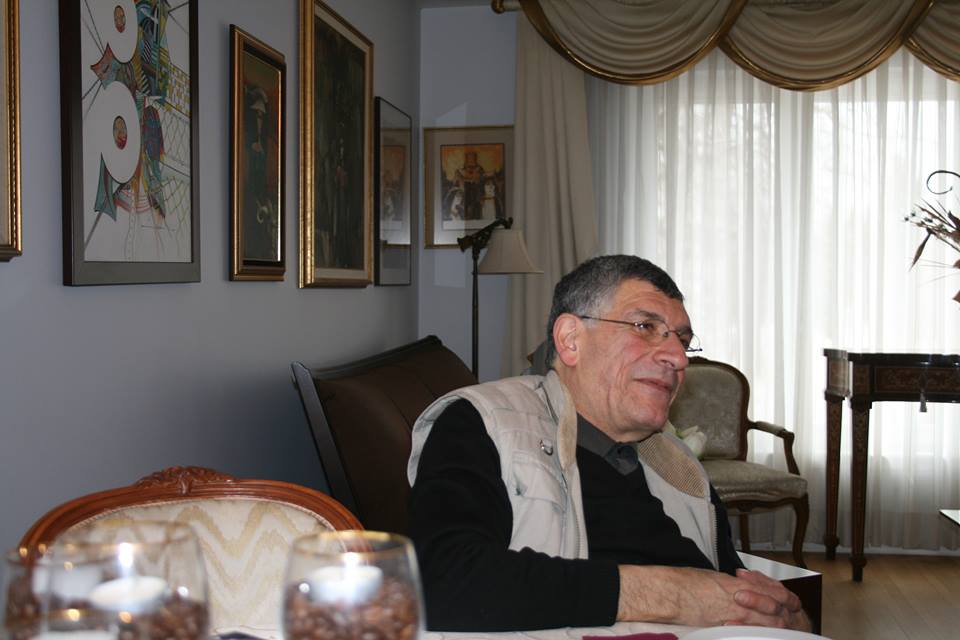By:Varak Babian
Hrant Alianak is many things: actor, writer, producer, director. These roles share a certain public quality to them, and it is worth noting here a habit Armenians often seem to exercise. It could be said that we place anybody who shares even a sliver of our common ancestry, and who exists in the public eye, on a pedestal of sorts, often placing a great deal of pressure on them to speak for us and to represent on our behalf. Perhaps it is that we are longing for some sort of validation from society and are attempting to stand on the shoulders of those who have “made it” to seek it.
Hrant Alianak is, above all, a professional. An individual who has carved a living through the avenue of artistic expression for the majority of his life. By way of forced migration and a version of the narrative that has coloured an entire population, he was born in Sudan, moved to Canada, and has done his part in contributing to Toronto’s ever growing and eclectic tapestry: weaving it with the experiences gained from television, theatre and film.
He has been involved with bodies of work that deal with both Armenian and more broadly drawn issues and themes. Is he an artist first and an Armenian second? Does his bloodline influence his narrative? As we meet for our conversation, I attempt to be honest about my own pre-determined versions of the “ideal” responses I am searching out, wondering if they themselves illuminate a set of insecurities and biases themselves.
V- We live in a world where, pardon the broad stroke, everybody wants to be famous. People strive not necessarily for fulfilment from a craft, but a sort of instant recognition. How hard it is to “make it” as an actor?
H-Acting is a number of things. It is the toughest thing. I often tell people don’t do it unless you absolutely have to. If it’s your dream, pursue it. If you can do other things and be equally as happy, don’t do it, it’s not worth it.
V- Was there ever a backup plan?
H- No, this is what I’ve always wanted to do. Since I was 12 years old living in Sudan, where there was no opportunity. People would say, “What are you talking about, you can’t be an actor”. But, it was my dream. It’s always been my dream. I’m very happy, at the very least, I’ve never done what I don’t want to do. I’ve never had to manage a corner store strictly to make money. I’ve been fortunate. My partner Sheila has always been there for support. She’s provided the stability whenever it might have been lacking. Teamwork is crucial.
V-From Sudan to Toronto. Sounds like a compelling heading for a travel log.
H- I’ve been in Canada for more than 50 years now. I was 17 when I left. I never dabbled in acting in Sudan. I finished school early. I was 15 and a half when I enrolled in university in Khartoum. I studied Economics, It was never my thing.
Then we moved to Canada. First to Montreal. Again, I was back in a classroom. My major this time was business administration. I’d constantly skip classes and go see films instead. The following year, we came to Toronto.
I became a postman for 2 years, and then tried the university route again. I never finished. I started taking acting classes, and by 1972 I was starting to write. My first play was under my belt, and it was a big success. At that time there weren’t that many people who would both write and direct. I was able to access grants, so I had the opportunity to make a good living for many years. It was the 70’s and I was working non stop. I was doing play after play after play, and then in the 80’s I started acting.
V-Was acting fulfilling in ways that writing or directing wasn’t.?
H- It was a mixed blessing. There weren’t that many Middle Eastern actors then. A role came along which required casting a Middle Eastern guy. So, I auditioned, and I got the part. My very first role was a big movie in Spain. I was there for a whole month. It was encouraging, and of course I got the bug. Some of it was enjoyable, and I made some money, but when it comes to acting, the deadly part is that you can go for weeks, or months without hearing from your agent, without getting an audition. Then you go to an audition, and, you blow it. Or, you think you did a really good job and you’re expecting to get it, and you don’t. And you remember there are 10-12 people auditioning for the same part, and they’re also very good at their craft. The whole process can be quite disheartening. I’ve had other things to focus on. I created my own work, first theatre, and now film.
V-I’m sure you fielded your share of questions in regards of what your nationality was. Was there a lack of awareness towards being Armenian?
H- No, they didn’t know. That still continues, less now. The usual questioning process would begin with “Where’s Armenia”, and I would list the neighbouring countries, close to this, south of that. At that time, it was apart of the Soviet Union. There’s less of that, because it’s such a multicultural climate, especially in Toronto.
V- Was there an Armenian community in Sudan?
H-Oh yeah, there were about 1000 Armenians. There were clubs. The English club, the Arabic club, the Greek club. There was the Catholic club, which was made up of the Italians. The Armenians had a club as well. My dad was the president for a couple of years. Picture an open air space. You could play tennis, soccer, basketball. That was a major part of how I grew up, being involved with activities the club would offer.
V- Sudan doesn’t seem to register as a hot bed for Disaporan activity.
H-No, no it’s not. Most of my relatives ended up in Beirut, and Cairo. I think they needed doctors, people with medical training in Sudan. That’s how that branch of my family came over there. I think there is only a handful of Armenians that still call Sudan home.
V- How were you first exposed to the Armenian community in Toronto?
H- Through my friends Kaloust and Souren. They had noticed my name on some kind of advertisement promoting a play I was involved in and they just showed up. It was at the formerly named Bathurst Street Theatre. My father never showed a desire to submerge himself within the Armenian community in Toronto. I’m not sure why, both my mom and dad were not the most sociable people. My father was very well established in Sudan. When we made the move to Canada, he had to reinvent himself, and that transition was difficult. I gained access to the community because of my friends.
V- Does being apart of Armenian themed productions offer a unique kind of satisfaction?
H-No, not really. Different projects have their own set of challenges and satisfactions. My work has always been experimental, and the Armenian community…well, in my experiences, can be quite reluctant to get behind that kind of art.
For example, “The Crooked Man”, (a 2008 production dealing with the Armenian Genocide) it was ok, but I pursued that project because that’s the way funding works. If there’s a social or multicultural element to something, you’re more likely to get grants, as opposed to an experimental thing. And that was the last play I did, because I didn’t really enjoy it.
I was second guessing my intentions. Not comfortable with being involved with a play solely because I could attain the money needed to create it. I mean I liked it, but my whole career has been developing experimental work. Exploring new ways of telling stories.
Anytime I submitted any kind of work that didn’t have a cultural element to it, I wasn’t getting the financial backing. 15, 16 failed attempts at securing grants. I realized that theatre is impossible for me.
Especially now, creating films is so accessible and doable. It’s just more commitment. It takes longer, with shooting just being a part of it. There’s the editing, the sound. It’s a full year’s worth of work. All that being said, it’s there. That’s the best part about it. With all its variables; good or bad, it’s there.
If I do a film that’s successful, the public’s curiosity will be initiated, and they’ll search out for other work that I’ve been a part of. That’s how the other films will live. What about my plays? They are just in book form. There’s no documentation of what they look like, it’s in people memories, and those people are dying.
V- A hypothetical question. You’ve been contacted to be a part of a film that deals with a considerable amount of Armenian issues. The film would serve as a mouthpiece for topics and concerns that don’t usually receive exposure. The script is sloppy, the story is weak, but…the money is more than right. Do you sign on?
H-I don’t know, I guess it depends. It’s very hard, I would hate doing that. Sometimes the financial reward isn’t the deciding factor. Television work for instance, I did a bit of that and I hated it. It’s not the director’s medium, it’s the producers’ medium. So, you’re just a hired gun. And you do make a lot of money. These people who direct one hour episodes, they get upwards of $30 000 dollars. It’s nothing to sneer at.
If I get the opportunity, would I turn it down? Probably not. But I wouldn’t go out of my way to pursue that kind of work. I’d prefer something in which I have full control.
V- Have you been to Armenia before?
H-No, never. I submitted some of my films to the Golden Apricot festival. The appreciation wasn’t there. I don’t think my type of storytelling would jive there.
V-Forget as an artist, more on a visceral level, you’ve never felt the urge?
H-No, no… Look, I was born in Sudan, went to an English school, was taught by Italian priests, and I eventually settled in Toronto, I don’t feel the connection. I mean of course Armenian issues are still important to me. The whole thing with Turkey really bugs me. Not admitting to the genocide, that sort of thing. But going to Armenia… I mean, I don’t not want to go, but it’s not a priority. I’d rather go to Paris again.
It’s interesting, for example, both of us speak Armenian. Why did we decide to have this conversation in English?





